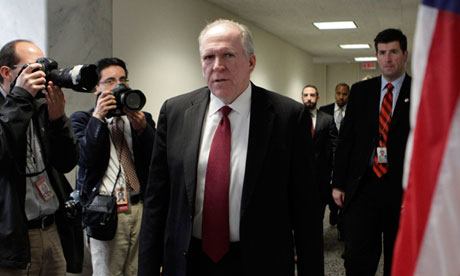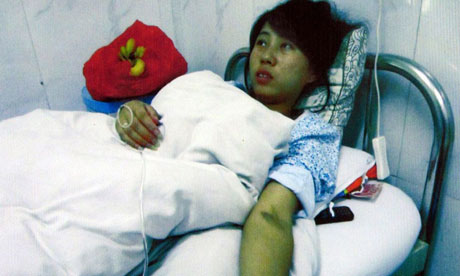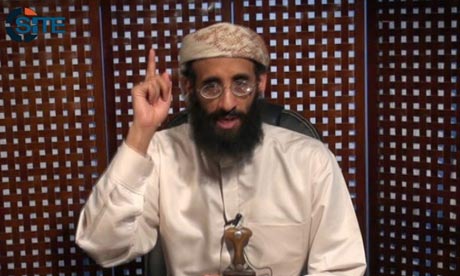Doc: We inject late-term fetus with potassium chloride to avoid problem of live, aborted infant
- Tue Feb 05, 2013 14:13 EST
A pro-abortion doctor is insisting there are
strict protocols in place to avoid the awkward problem of having "to deal with a live, aborted infant."
In a letter printed in
Tuesday’s National Post,
Dr. Christiane Dauphinais seems to be trying to quell public concern
after the mainstream media reported on StatsCan data suggesting hundreds
of babies were left to die after being born alive following failed
abortions between 2000 and 2009. But something tells me this isn’t going
to help her cause.
The doctor writes:
“When performing an abortion on a woman who is 21 weeks pregnant or
more, in addition and prior to following general procedures, we are
instructed to inject digoxin or potassium chloride into the fetus or the
amniotic sac. This effectively kills the fetus, thereby avoiding having
to deal with a live, aborted infant."
The instruction, she says, comes from a document she received this week by the Quebec College of Physicians.
After three MPs
called for a homicide investigation
into the death of these 491 children last week, Canada’s abortion lobby
rushed to pass it off as a rehashing of the abortion debate rather than
a concern over babies who were
born alive and already protected under the Criminal Code.
But the abortion advocates also recognized that the story posed a danger because it highlighted the reality of
late-term abortion in Canada. Though it’s
legal
to give a lethal injection to a child in the womb who’s capable of
surviving on his own, most Canadians have little idea this is going on
and would be horrified to learn that many hundreds or more babies are
killed this way every year.
The fact is that the vast majority of people are disgusted by abortion,
even if they think it should be legal, so they would rather simply
ignore it. Many might support the amorphous ‘right to choose’, but you’d
be hard-pressed to get much public support for lethally injecting
viable children in the womb, let alone dismembering and decapitating
them as happens in second-trimester D&E abortions.
We get a powerful opportunity, however rare it is, when we can break
through into the mainstream media to highlight the nitty-gritty of what
actually happens during an abortion.
The most high-profile abortion advocates actually rarely talk about
abortion in public. Up until recently Planned Parenthood’s mantra has
been all about ‘choice’ with little but hushed mention of what’s
actually being
chosen. And now they’re even
backing away from the ‘pro-choice’ label because it’s too connected to abortion in the public mind.
All of this points to a good general rule for pro-lifers: when we can get the media talking about
abortion, we win.
Today’s letters: Late-term abortions are not happening in Canada without a ‘reason’

Yvonne Berg/National PostDr. Carolyn Bennett says late-term abortions are never done in Canada without serious indications of a problem.
Re:
Waiting For An Abortion Law, editorial, Feb. 2.
On Twitter, Jonathan Kay (the Post’s Managing Editor Comment) stated:
“If you can find an incorrect sentence in this editorial, identify it.”
The misleading sentence is:
“It is perfectly legal in Canada to have or
perform an abortion — for any reason, or no reason at all — at 20, 25,
30 or 35 weeks gestation.”
I am totally fed up with “lawyered” assertions that totally misrepresent
the facts. While in Canada we do not have a law, we do have very strict
professional guidelines. No physician in Canada can terminate a
pregnancy over 24 weeks without serious indications that the life of the
mother is at risk or that the fetus has very serious malformations. I
have sat with these women as they received the terrible news and sat
with them throughout the terrible long, tear-drenched process. The
assertion that late-term abortions can be performed “for any reason, or
no reason at all” is just not true.
I challenge Mr. Kay to find one late-term abortion performed in Canada
to a healthy mother with a healthy fetus. I am one of many politicians
“willing to tackle” this subject. He needs to be one of many journalists
who are prepared to admit when their fine prose may have misled
Canadians … in this case that late-trimester abortions are not happening
in Canada without “reason.”
Dr. Carolyn Bennett, MP for St. Paul’s, Toronto.
How to avoid live fetuses
Re:
Treat Late-Term Abortions As Homicide, Backbench MPs Say, Feb. 1.
As physicians, we are trained to assist as best we can people facing
various medical challenges. One of the challenges a pregnant woman may
face is a miscarriage. If a woman miscarries before her fetus is viable
(i.e., during the first 20 weeks of her pregnancy), our role is to
support her in her grief. If she miscarries in or after the 21st week,
our duty is to provide her newborn child with the care it requires to
survive. As a result of this training, it has always been clear for me
where the limit on elective abortion should be set:
At 20 weeks of
gestation.
This was reinforced this week in a document I received from The Quebec
College of Physicians, titled “Guidelines in performing abortions.” When
performing an abortion on a woman who is 21 weeks pregnant or more, in
addition and prior to following general procedures, we are instructed to
inject digoxin or potassium chloride into the fetus or the amniotic
sac. This effectively kills the fetus, thereby avoiding having to deal
with a live, aborted infant.
Dr. Christiane Dauphinais, Toronto.
Abortion is a travesty …
Alberta MP Leon Benoit says that in late-term abortions some babies
are born alive and then killed. Of course this is homicide or, more
appropriately, infanticide, just as killing a baby in the womb is
feticide. Canadian law permits feticide if the procedure is a “medical
abortion,” but not the killing of a child that is born, whether or not
as the result of an unsuccessful abortion. That is the law, regardless
of practice. Yet, what is the difference between feticide or
infanticide? A baby dies in either case, even although one procedure is
“legal” and the other is not. The problem lies in Canadian law’s
definition of “person,” which is a travesty of justice, crying out for
revision.
Moira McQueen, executive director, Canadian Catholic Bioethics Institute, Toronto.
Regarding abortion, MP Rona Ambrose states: “This is an issue that
women are not interested in debating.” I must correct Ms. Ambrose — I am
one of tens of thousands of Canadian women who are very much interested
in debating this issue. As minister of the Status of Women, Ms. Ambrose
should be listening to all women, not just those who agree with her
values on abortion.
Liz Rybka, Brampton, Ont.
The letter the three MPs sent to the RCMP is not speaking to
late-term abortions in general, which are legal in Canada, one of the
few countries world-wide with no restrictions at all on abortion. What
the letter is decrying are the 491 late-term abortions documented by
Statistics Canada in which the baby was born alive, but then was left to
die. The MPs are simply requesting an investigation. Is that too much
to ask? Are we really comfortable as a society sweeping this under the
rug?
Ruth Meerveld, Beamsville, Ont.
… or is the status quo OK?
The abortion issue was settled years ago. Until it is born, a fetus
is part of its mother’s body and is subject to her wishes — and no one
else’s.
Leave this subject; let it die.
Charles Hooker East Garafraxa, Ont.
Re:
Anti-abortion display ‘private property’, B.C. town says, Feb 1.
Regarding the mock cemetery for aborted fetuses in Abbotsford, Joyce
Arthur, spokesperson for the Vancouver based Abortion Rights Coalition
of Canada, states that abortion is a “private experience that is
absolutely no one’s business” (beyond that of the woman herself,
obviously). How very wrong she is. That that aborted fetus will not be
supporting me in my dotage makes it very much my business. That it is a
human being, not an orange or an apple, and I my brother’s keeper, makes
it much, much more so.
Jeff Willerton, Airdrie, Alta.
Re:
Treat late-term abortions as homicide, backbench MPs say, Feb. 1; Re: Waiting for an abortion law, editorial Feb. 2.
The three Tory MPs named in this editorial are to be praised for raising
the issue of “homicide” when a baby who has already exited the womb
live is killed or left to die.
The Post, while allowing that an abortion law is long overdue, takes
exception to the use of the term “homicide,” calling it “lurid.” But
technically, as laws now stand, there may indeed be cases of “homicide,”
at least where there is a chance that the baby may survive with some
quality of life if proper care is given.
The term “lurid” reminds me of the rhetoric hauled out by
pro-abortionists whenever photographs are shown of aborted fetuses.
Their delicate sensibilities are supposedly offended by such
photographs. But aren’t they rather more worried that the general
public, confronted graphically with the consequences of abortion to
living beings (the fetuses), will rise up in repugnance against the
hateful practice, which for thousands of years was dismissed out of hand
as intrinsically evil?
Yes indeed, some kind of law, any law, is needed to curb the killing of
fetuses. How about defining as a “human person” the human egg as soon as
it is fertilized? Scientists tell us unequivocally that it is a human
being with potential, not merely a potential human being.
Lars Troide, Apple Hill, Ont.
Canada’s justice system is the most important tool in providing
protection for the weak and vulnerable. That these live-birth abortions
have not been investigated shows the system is failing those members of
the human family who are the weakest and most defenceless and that we
are on a slippery slope to legalized infanticide. Canada needs to act
now to address this gross violation of human rights by enforcing
existing Criminal Code protections for newly born children. Thus I
applaud the three MP’s who brought this to the attention of the RCMP
Commissioner.
It’s time that as a collective nation we ask if “choice” is enough
reason for law enforcement to be silent, even after a child is born? For
truly, how is this choice any different than the choice to kill an
infant or any other born human?
Either human rights apply to all humans or we may as well throw the notion out the window all-together.
Mike Schouten, Campaign Director, WeNeedaLAW.ca, Surrey, BC
Thank you, National Post for reminding us of the fact that Canada “is
the only nation in the Western world without an abortion law.”
God Bless Messers, Vellacot, Benoit and Lizon for being men of fortitude
in their pursuit of the truth. I pray that the MP’s supporting you
silently will find the courage to stand with you publicly in the House
of Commons.
Rhonda Wood, Brampton, Ont.
Kudos to the three federal backbenchers, MPs Maurice Vellacott, Leon
Benoit and Wladyslaw Lizon, for fighting to keep the atrocities from
being swept under the rug by their brave efforts. This should uncover
the truly insidious evil of abortion and all its ugly realities. It has
progressed from originally attempting to protect women from harming
themselves to women and babies being harmed by doctors, to expanding and
extending the term limit to no limit, without regard to consequences
for any kind of moral or ethical responsibility by doctors to babies,
(who also become their patients in reality). How can we ignore the 491
babies left to die and not cry out for some kind of retribution or
justice? What would it take to at least admit that it is nothing short
of premeditated first degree murder and it has to stop?
Anne Smyth, Toronto.
I am horrified to see the effects of the crown jewel of the feminist
movement: abortion on demand, that requires that for later term
abortions the baby be killed in the womb “perhaps using lethal
injection” to “avoid legal complications and psychological trauma for
the staff” and that live-born babies are “likely due to professional
failure” of not killing the baby prior to that abortion so that the
staff is not traumatized by receiving an alive baby.
I think every one involved should feel the psychological trauma of
killing the baby in the womb: the mother, the father, the family, the
doctor’s performing the killings despite taking the Hippocratic Oath of
“First Do No Harm”, the nurses, the politicians who have legalized such
killings and the complicit voters who support the abortion legislation,
so that they can weigh the blood that is on their heads for freeing
women and men from the natural consequences of sexual behaviour.
Also, let us not hide behind the euphemism ‘fetus’, considered to be a
non-human being. Call abortion the killing of the baby growing in the
womb of the mother, who is in the family way because of a union between a
man and a woman.
Jiti Khanna, Vancouver,
I read with rapt attention Saturday’s front page article concerning
late term abortions in Canada. Thank you for giving it the coverage it
deserved even though it was not an emotionally easy read . So
interesting how language effects how we think and act. A mother who
plans to take her pregnancy to full term will refer to the unborn as
“her baby.” One who plans not to carry the unborn to full term and
those who will assist her refer to the unborn as “a fetus.”
Patrick Stewart, Combermere, Ont.













